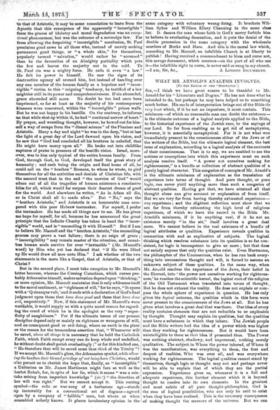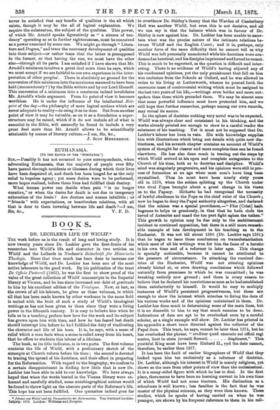WHAT MR. ARNOLD'S ANALYSIS INVOLVES.
[TO THE EDITOR OF THI1 9PSO2.43011.1 Sin, —I think we have great reason to be thankful to Mr. Arnold for his " Literature and Dogma." He has not done what he intended to do, but perhaps he may have helped us to something much better. His mole of interpretation brings out of the Bible the very least which, if it be not an imposture, it must contain. This minimum—of which no reasonable man can doubt the existence— is the ultimate outcome of a logical analysis applied to the Bible, to the historical experience of the Jewish race, to the sayings of our Lord. So far from enabling us to get rid of metaphysics, however, it is essentially metaphysical. For it is not what was immediately present to the consciousness either of the Jews or of the writers of the Bible, but the ultimate logical element, the last issue of explanation, according to a logical analysis of the contents of their consciousness. That is to say, we are enabled to see the notions or conceptions into which this experience must on such analysis resolve itself. " A power not ourselves making for righteousness," is a bundle or collection of abstract qualities of a purely logical character. This congeries of concepts of Mr. Arnold's is the ultimate minimum of explanation as the translation of experience into terms of thought. And pure thought, or pure logic, can never yield anything more than such a congeries of abstract qualities. Having got that, we have attained all that thought alone can give account or explanation of from itself. But we are very far from having thereby exhausted experience— any experience ; and the slightest reflection must show that we are far from thereby exhausting the high level of religious experience, of which we have the record in the Bible. Mr. Arnold's minimum, if it be anything real, if it be not an existence merely " in the air," itself involves a great deal more. We cannot believe in the real existence of a bundle-of logical attributes or qualities. Experience reveals qualities in connection with and as explicative of subjects. The logical thinking which resolves substance into its qualities is so far con- sistent, for logic is incompetent to give us more ; but that does not satisfy anyone that only the qualities exist. Even Hartmann, the philosopher of the Unconscious, when he has run back every- thing into unconscious thought and will, is forced to assume an unknown subject of these qualities. In the same way, when Mr. Arnold resolves the experience of the Jews, their belief in the Eternal, into ' the power not ourselves working for righteous- ness,' he reaches the scientific kernel, the logical root of the religion of the Old Testament when translated into terms of thought., But he does not exhaust the reality. He does not explain or com- pass the whole sphere of experience in question. He has only given the logical outcome, the qualities which in this form were never present to the consciousness of the Jews at all. But he has given what involves a great deal that was there. Our idea of every reality contains elements that are not reducible to or explicable by thought. Thought may explain its qualities, but the qualities must have a substance in which they inhere. The Jewish people and the Bible writers had the idea of a power which was higher than they working for righteousness. But it would have been unintelligible to them as their idea if presented thus. The Power was nothing abstract, shadowy, and impersonal, nothing merely
qualitative. The subject in Whom the power inhered, of Whom it was the manifestation, was everything to them, the first and deepest of realities, Who was over all, and was everywhere working for righteousness. The logical qualities cannot stand by themselves, though logic or thought may not and perhaps never will be able to explain that of which they are the partial expression. Experience gives us, whenever it is a full and adequate experience, this further element which it is beyond thought to resolve into its own elements. In the greatest and most subtle of all pure thought-philosophies, God is the sum of logical possibilities, who can only be said to exist
when they have been realised. This is the necessary consequence of making thought the measure of the universe. But we can never be satisfied that any bundle of qualities is the all which exists, though it may be the all of logical explanation. We require the substratum, the subject of the. qualities. This power, of which Mr. Arnold speaks figuratively as " a stream of ten- dency" operating so as to further righteousness, must be conceived as a power exercised by some one. We might go through " Litera- ture and Dogma," and trace the necessary development of qualities into their subject—or rather trace that the latter is presupposed in the former, so that having the oue, we must have the other also--through all its parts. I am satisfied if I have shown that Mr. Arnold'e minimum involves a great deal more than he says, which we must accept if we are faithful to our own experience in the inter- pretation of other peoples'. There is absolutely no ground for the conversion of this minimum into the maximum assumed to have been held (unconsciously?) by the Bible writers and by our Lord Himself. This conversion of a minimum into a maximum indeed invalidates Mr. Arnold's whole argument. From his point of view it becomes worthless. He is under the influence of the intellectual Zeit- geist of the day—the philosophy of mere logical notions which are never adequate to reality—in using it as he does. But from another point of view it may be valuable, as on it as a foundation a super- structure may be raised, which if it do not include all of what is essential in the Bible, will assuredly be found to include a very great deal more than Mr. Arnold allows to be scientifically attainable by means of literary culture.—I am, Sir, &c., J. SCOT HENDERSON.







































 Previous page
Previous page